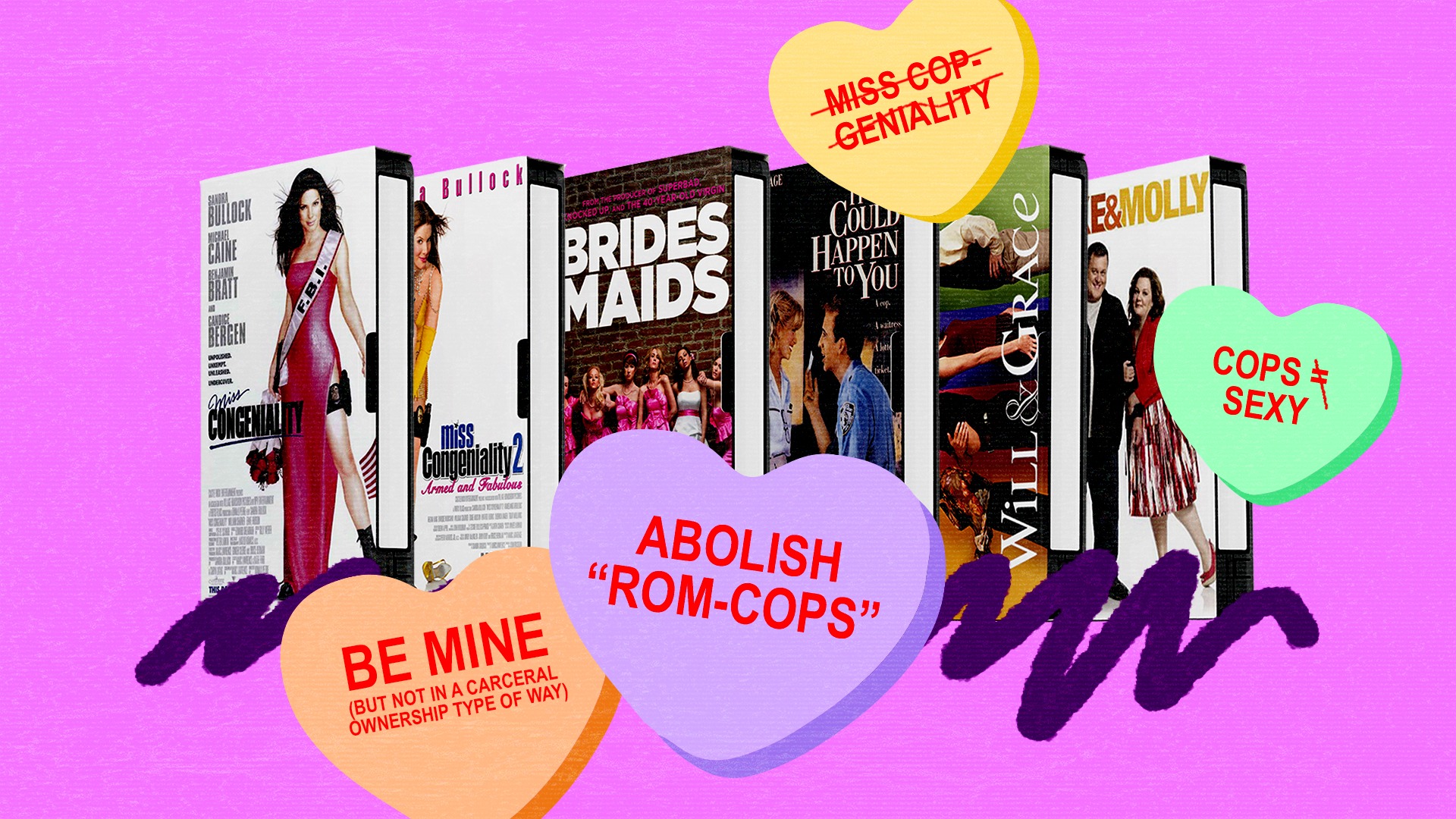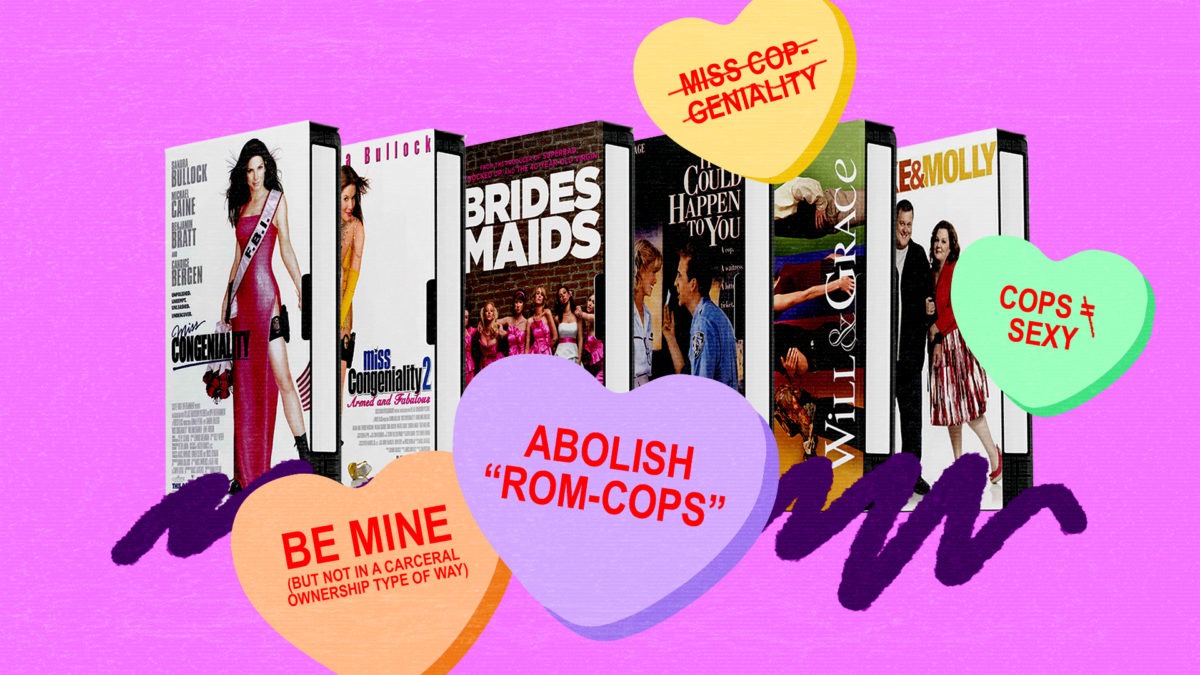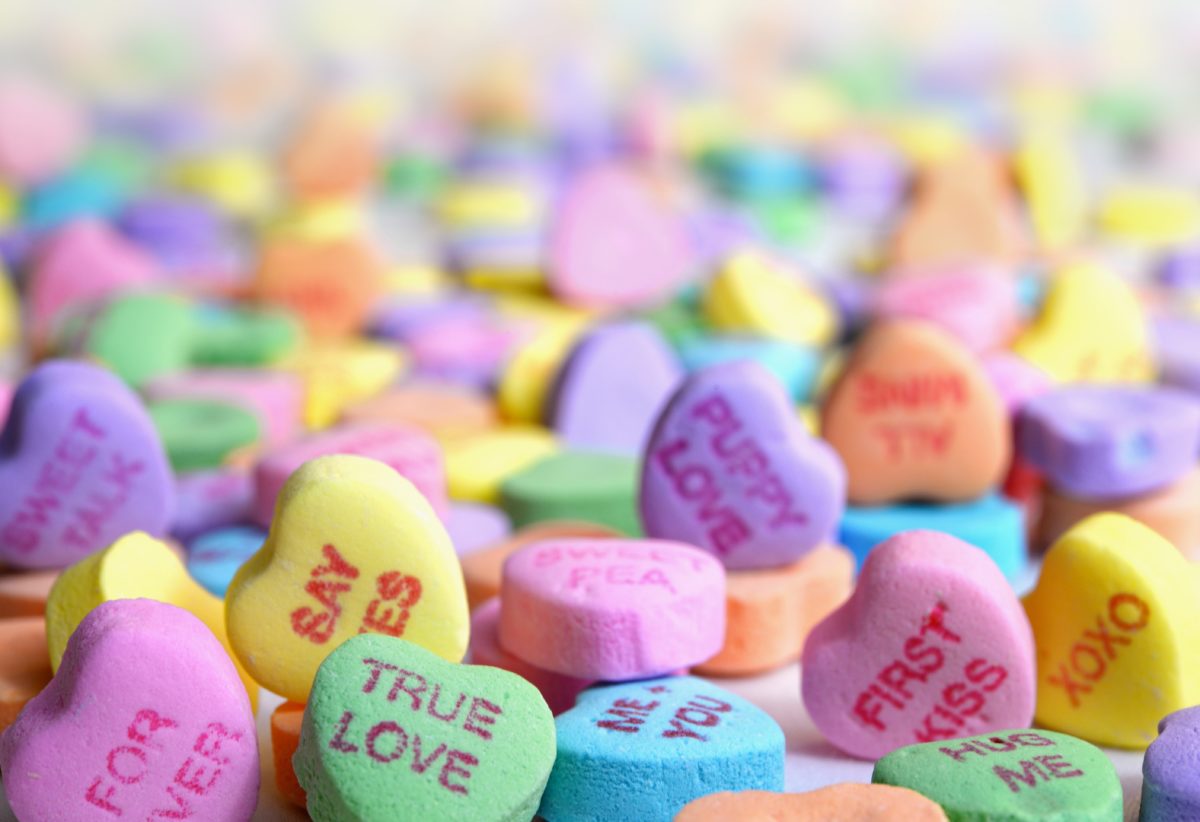Newsletter
The Romantic Comedies Convincing You To Fall In Love With The Police
There is nothing romantic about the police state. And yet, in some of the biggest rom-coms, white cops are underdogs looking for the right person to love.


The romantic comedies convincing you to fall in love with the police
by Elizabeth Weill-Greenberg
This story is published in collaboration with Scalawag. For more reporting that explores the intersection of popular culture and justice, sign up for Scalawag’s pop justice newsletter.
There is nothing romantic about the police state.
And yet, in some of the biggest hits of the rom-com world, white cops are the underdogs, just looking for the right person to love who loves them back. “Rom-cops,” if you will, are designed to signify respectability, trustworthiness, and working-class bona fides—and to persuade the audience to cheer them on as they try to find someone to protect and serve after hours.
These portrayals from a suite of white actors erase the reality that police are and always have been an occupying force that terrorizes people of color day after day, with near absolute impunity. When their brutality makes a cameo appearance, it’s in the form of a joke or framed as a necessary use of force, or, often, both.
Whether a sitcom, hourlong drama, or movie, almost all scripted media about cops promulgates the lie that law enforcement is a fundamentally decent institution that exists to keep us safe, cared for, and even loved. In these mostly white romantic comedy worlds, cops are goofballs-turned-love interests or the reliable buddy waiting in the wings. Without a hint of irony, their white partners are safe with them. And these depictions aren’t too far removed from the experiences of the industry’s target audience, white women like me, who, by and large, don’t have to worry that a cop is going to frame us, kill us, or brutalize our kids (as long as they appear white).
In rom-coms, there’s certainly no hint of the institution’s unrelenting terror and brutality, primarily directed against Black people—from a child playing in a park to a photographer driving home. Black people are three times more likely to be killed by police than white people. 2022 was the deadliest year for police killings in at least a decade, according to Mapping Police Violence, and less than two months into 2023, we’re already off to a violent start.
Last month, Los Angeles police officers killed high school teacher Keenan Anderson, a Black man, after he was in a car accident and asked them for help. On January 7, Memphis police officers stopped photographer and skateboarder Tyré Nichols, also a Black man, while he was driving home. Less than 300 feet from the home he shared with his mother and stepfather, at least six officers mercilessly attacked him. He died from his injuries three days later.
Rom-coms don’t need to promote the police state; in fact, copaganda detracts from what makes rom-coms so, well, lovable—their predictability, their montages, their love letters to crushes and first kisses. They’re a cozy blanket on a rainy night. (And yes, they’re also full of cliches.) Ahead of Valentine’s Day, I went on a copaganda rom-com binge, granting me the unique authority to induct these classics into the entirely unofficial and not-yet-trademarked Copaganda Hall of Fame.
All nominees must meet my criteria:
- venerated cops as working-class heroes,
- copaganda subtly slipped into their storylines,
- and/or minimized police brutality.
Extra points for those that accomplished all of the above.
Scalawag is a journalism and storytelling organization that works in solidarity with oppressed communities in the South to disrupt and shift the narratives that keep power and wealth in the hands of the few.

1. Bridesmaids (2011)
Annie Walker’s (Kristen Wiig, who also co-wrote the screenplay) life is in rom-com shambles. Her best friend is getting married. She’s sleeping with a man she wants to date, but he’s only interested in hook-ups. Her bakery has gone out of business.
But it looks like her luck may change when Wisconsin State Patrol Officer Nathan Rhodes (Chris O’Dowd) stops Annie for suspected drunk driving. She insists she’s sober and dances to prove it to him.
He says he’s going to give her a ticket for broken brake lights but decides not to after they chat and, instead, refers her to a mechanic. She drives off. She wasn’t fatally shot, beaten, left paralyzed, or arrested.
Last year, most police killings of civilians began with traffic stops, mental health checks, and other incidents where there was no allegation of violence, according to Mapping Police Violence.
Instead, Annie, who is white, and Nathan, who is white and from Ireland, meet up again and fall for each other. He buys healthy snacks at the convenience store (baby carrots) and detests littering. He encourages her to start baking again.
Annie ends up rejecting him because she’s annoyed by his efforts to “fix” her.
Before they reconcile, Annie attempts to enlist Nathan’s help to find her best friend, Lillian (Maya Rudolph), who has gone missing on her wedding day.
Annie drives up to Nathan’s police car. Still angry, he ignores her.
To get his attention, she races past his car yelling, “Reckless driving!” And then, “I’m speeding! You better pull me over!”
She tosses trash on the road and pretends to drink a beer. Then she drives past slowly, listening to Natural Born Killaz, her body low down in her seat, in what can only be described as an impersonation of her idea of a young Black man.
Annie isn’t the only one to fall for a member of law enforcement. Another member of the bridal party Megan Price (Melissa McCarthy, who later starred with Sandra Bullock in the copaganda movie The Heat) becomes smitten with Air Marshal Jon after sitting next to him on a flight while he’s undercover.
Bridesmaids was set in Milwaukee and released in 2011. That year, 22-year-old Derek Williams, a Black man, spent the last moments of his life handcuffed in the back of a police car, pleading for help, the Milwaukee Journal Sentinel reported.
Squad car video shows that for more than seven minutes, Williams gasped for breath and begged Milwaukee police officers for help, according to the paper, which requested, received, and reviewed the video. One rolled down a window. Williams fell unconscious. For at least 15 minutes between his arrest and death, he repeatedly told officers he could not breathe, according to the paper.
Despite being ruled a homicide, no officers were criminally charged for Williams’ death.

2. Miss Congeniality (2000)
Sandra Bullock plays Gracie Hart, an FBI agent who goes undercover at the Miss United States beauty pageant. She ends up saving the pageant, falling in love with another agent, and getting crowned as first runner-up.
The movie opens with Gracie as a kid standing up for a boy who’s being bullied. Fast forward to her as an adult: She’s an FBI agent with unkempt hair and food stains on her rumpled suit. She loves guns and carries several on her at all times.
In one of the movie’s first scenes, she puts a siren on top of her car and speeds through the streets. She parks, walks into a Starbucks, and pushes through the crowd of customers. When someone challenges her, she flashes her badge. At the counter, she places an order for her law enforcement colleagues, much to the disdain of the long line behind her.
Later in the movie, when she’s gone undercover at the beauty pageant as Gracie Lou Freebush, the host asks the contestants, “What is the one most important thing our society needs?” Each dutifully answers, “World peace.” Until Angie (undercover as Gracie).
“That would be harsher punishment for parole violators.”
Beat.
“And, world peace.”

3. Miss Congeniality 2: Armed and Fabulous (2005)
The sequel picks up shortly after the first movie ends. It’s more buddy comedy than rom-com. FBI Agent Hart is now a celebrity, a role model for little girls, and an inspiration for women. An early working title of the sequel was America’s Next Top Carceral Feminist. (This is a joke, as far as I know.)
In this cinematic universe, the FBI is a band of scrappy misfits. It’s a racially integrated workforce committed to ridding the world of bad guys, like the bougie housewives who rob banks or the bumbling Las Vegas loan sharks (all played by white-presenting actors).
Agent Sam Fuller, played by Regina Watkins, who is Black, is assigned to be Gracie’s bodyguard. She had been transferred into the unit from Chicago because of “anger management problems,” Sam’s boss, who is also Black, tells her. (So you see, it’s not racist.) While Angie is a charming, gun-toting underdog who snorts when she laughs, her Black counterpart’s primary character trait is angry.
The two start as enemies and become friends, and eventually crime-solving partners.
Sam tells a fellow agent that when she doesn’t want to answer a question she’ll say, “I’m dizzy from smashing a suspect’s head into a wall and I can’t remember anything.”
Later, Sam asks Gracie what they should do if a suspect won’t “cooperate” with their interrogation.
“Violence,” says Gracie, who’s been out of the field for months. “I have some catching up to do.”

4. It Could Happen to You (1994)
Nicolas Cage plays big-hearted NYPD officer Charlie Lang. When he can’t afford to tip his waitress, Yvonne Biasi (Bridget Fonda), he tells her if he wins the lottery, he’ll share the fortune with her. He wins the next day and makes good on his promise.
The movie, loosely based on a true story, came out the same year that NYPD Officer Francis Livoti put Anthony Baez in a chokehold, killing him. Baez had been playing football with his brothers when the football accidentally hit Livoti’s police cruiser.

Honorable TV Mentions:
Will & Grace (1998-2006, 2017-2020)
For several seasons of the nearly all-white NBC sitcom set in Manhattan, Will Truman (Eric James McCormack) dated NYPD cop (and eventual detective) Vince D’Angelo (Bobby Cannavale.) In 2005, during the “Partners ‘n Crime” episode in season 8, Jack (Sean Hayes), their friend and actor, announces he’s been cast in a role as a police officer who pistol whips people.
“Maybe I can help,” Vincent tells him. “When I was addicted to painkillers, I used to pistol whip people for jaywalking.”
Audience laughter.
In the same episode, Vincent tells Will, “We finally caught that subway killer today.”
“I thought you said you arrested somebody yesterday.”
“Oh yeah,” Vince says. “Turns out he was the wrong guy. Worked him over pretty good.”
Audience laughter.
“Well, at least now he has a funny story,” says Will.
More laughter.
About six months after the episode aired, in the early morning hours of Nov. 25, 2006, undercover NYPD officers shot about 50 bullets at Sean Bell’s car, with Bell and his two friends inside, all of whom were unarmed.
Bell, a 23-year-old Black man, was killed, just hours before his wedding. His friends were shot multiple times but survived. Three officers were charged with Bell’s death and acquitted. Two of them didn’t even lose their pension.
Mike and Molly (2010-2016)
The CBS sitcom centered around the romantic relationship between Molly (Melissa McCarthy) and Chicago police officer Mike (Billy Gardell), a shy, gentle, every(white)man who loves aquariums.
Outside the sitcom world, the Chicago Police Department is notorious for its brutality. From 1972 to 1991, Detective Jon Burge either directly tortured or ordered the torture of more than 100 Black men and women at the department’s Area 2 headquarters.
In 2010, the year Mike and Molly premiered, Burge was convicted of obstruction of justice and perjury. Five years into the show’s six-year run, the Chicago Tribune published an investigation into every time an officer fired their weapon between 2010 and 2015. During that time police killed almost 100 people, and about four out of every five people shot were Black males. One of those people was 17-year-old Laquan McDonald. Chicago Police Officer Jason Van Dyke shot McDonald 16 times while the teenager was walking away.
That’s all for this week. As always, feel free to leave us some feedback, and if you want to invest in the future of The Appeal, donate here.
